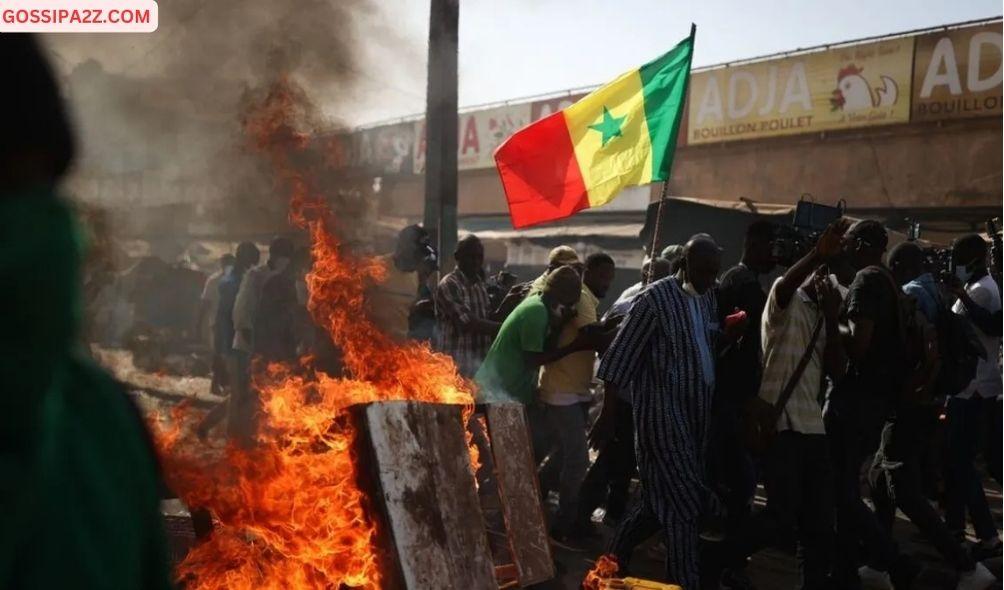Senegal’s Elections: Rising Tensions Spark Fears of Escalation
On Monday night, Senegal’s parliament decided to delay the presidential election originally scheduled for February 25th, moving it to December 15th. This move, which goes against Senegal’s democratic norms, extends President Macky Sall’s term in an unprecedented manner.
In the face of extensive public protest against the delay, certain opposition legislators attempted to obstruct the proceedings within the National Assembly premises. However, security forces stepped in, removing them from the central platform and enabling the voting process to continue.
The disputed legislation was ultimately approved by 105 members of parliament (MPs) out of the 165 seats in the Assembly.
WHY DID PRESIDENT SALL CALL FOR A POSTPONEMENT?
Sall, who has decided not to seek re-election and has served the maximum two terms allowed by the constitution, explained that he postponed the election because of a disagreement concerning the list of candidates and accusations of corruption within the constitutional body responsible for its compilation.
“These troubled conditions could seriously undermine the credibility of the ballot by sowing the seeds of pre- and post-electoral disputes,” he said in a surprise speech to the nation hours before official campaigning was meant to start.
The Senegalese Democratic Party (PDS), in opposition, backs the decision to postpone the election. This party, whose candidate was disqualified due to dual nationality concerns, introduced a bill in parliament advocating for the delay before President Sall’s announcement.
WHAT DO HIS OPPONENTS SAY?
Other opposition and civil society groups have angrily rejected the postponement, with some accusing Sall of orchestrating an “institutional coup” to extend his tenure.
Three out of the 20 individuals running for president have filed legal objections to the postponement, as indicated by documents from the Constitutional Council.
Two additional contenders have pledged to contest it through legal channels, increasing the likelihood of an extended legal dispute.
WHY IS THIS SIGNIFICANT?
Senegal has consistently adhered to timely presidential elections, establishing a reputation for being one of West Africa’s more stable democracies. The country has experienced four predominantly peaceful transitions of power through electoral processes since gaining independence from France in 1960.
The sudden delay has disappointed individuals who had expected Senegal to adhere to a conventional electoral schedule, a practice that has become less prevalent in West Africa. In this region, military coups and constitutional maneuvers have led to a decline in democracy in several countries in recent times.
WHAT HAPPENS NEXT?
Sall’s declaration and the resulting public outcry have sparked concerns that the nation may witness a recurrence of the violent demonstrations observed in the last three years. These protests were fueled by apprehensions that he might seek a third term and allegations of marginalizing political opponents.
Following the decision to postpone the election until December 15, the primary political and economic alliance in West Africa, ECOWAS, conveyed its apprehension. It called upon politicians to initiate measures to reinstate an electoral timetable that aligns with the constitutional requirements.
ECOWAS has employed sanctions and other forms of pressure in an attempt to compel nations in the area to return to a more stable democratic foundation in recent years. However, these endeavors have mostly proven ineffectual.
“A postponement could open the door for subsequent postponements and allow the president to do many things,” a Barclays analysis said.
Moody’s ratings agency has cautioned that an extended postponement of the election might impede the nation’s scheduled fiscal consolidation by complicating the implementation of policies, including the committed gradual elimination of energy subsidies by 2025.
Senegal’s Elections: Rising Tensions Spark Fears of Escalation
